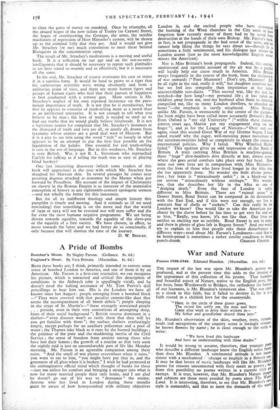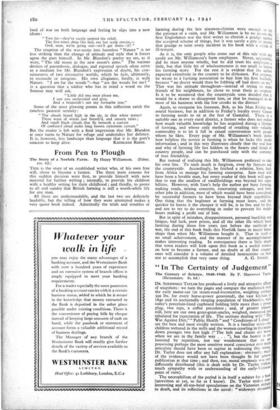War and Nature
Poems 1930-1940. Edmund Blunden. (Macmillan. ros. 6d.) Tux impact of the last war upon Mr. Blunden's poetry was profound, and at the present time this adds to the interest of the appearance of this collection of his poems. That harmless and beautiful aspect of Nature, native to the English poet, that has been, from Wordsworth to Bridges, the orthodoxy (or heresy) of our laureates, is Mr. Blunden's testament also. The war cage as a shock to ihis faith, but it failed to destroy it, for it is a faith rooted in a childish love for the countryside.
" Here, in the circle of these giants green, The sward lies softly yet, the men and boys Come after work to drive their wickets in— My father and grandfather shared these joys."
Mr. Blunden's observation of the skies, weather, trees, streams, roads and occupations of the country scene is lovingly minute; he knows flowers by name ; he is close enough to the earth to write:
" We have lived this landscape
And have an understanding with these shades."
It would be wrong to assume, therefore, that younger P°61 who describe a different landscape know the Rnglish scene better than does Mr. Blunden. A sentimental attitude is not ince°. sistent with a mechanised ndscape or implicit in a flowery on!. It may be that lovers of rustic landscape will like Mr. Blundoi poems for reasons unconnected with their merit as poetry bui from this possibility no poems written in a current style 21/ exempt. It is true, however, that Mr. Blunden's Nature aslages, and subjects are those most avoided by poets since The Was(' Land. It is interesting, therefore, to see that Mr. Blunden's style is metastable, and that to meet the demands of the waste
land of war on both language and feeling he slips into a new idiom : " Two hit—they've surely spotted the relief,
The five-nines drop like hail, my hot scalp creeps,—
God, man, we're going out—we'll get there—if ! "
The eruption of the war-scene into harmless " Nature " is no less striking than the change of attitude and style that it forces upon the poet himself. In Mr. Blunden's poetry we see, as it were, " The old moon in the new moon's arms." The various devices of parenthesis, dialogue, and reported speech often serve as a medium for Mr. Blunden's expression of doubt, his con- sciousness of two alternative worlds, which he fails, ultimately, to reconcile or integrate. His own allegiance, finally, is with Nature. " I am for the woods "—but " are the woods for me? " is a question that a soldier who has in mind a wood on the Somme may well ask.
" Little did you once please me, I saw you undersized and gray, And a beanstalk's not my favourite tree."
Some of the most pleasing poems in this collection catch the timeless pastoral serenity : " The clouds breed high in the air, in thin white trains? These warn of winds just breath'd, and unseen rains ; And small black clouds that fly beneath a curtain Of confused cloud make long brown rainstorm certain." But the reader is left with a final impression that Mr. Blunden at once turns to Nature for refuge and undertakes her defence. It, is, however, less landscape than language that it is the poet's































 Previous page
Previous page